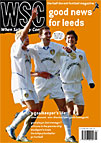 Neil Heath looks at the career to date of a former Nottingham Forest striker, torn between football and rock ’n’ roll and not quite succeeding at either
Neil Heath looks at the career to date of a former Nottingham Forest striker, torn between football and rock ’n’ roll and not quite succeeding at either
Paul McGregor was once branded the first “Britpop footballer”. In 1995 he broke into the Nottingham Forest first team and a year later his band, Merc, were brought to the attention of the man who discovered Oasis. There seemed to be no end to his talents. But during the 1997-98 season McGregor was sold to Plymouth Argyle, and he now plays for Northampton Town. Was he a victim of turbulent times at the City Ground or did rock ’n’ roll stall his football career?
Paul McGregor made a name for himself in 1995-96, securing a place in Frank Clark’s first team and scoring some vital goals. In November, he came off the substitutes’ bench to score the winner against Lyon in the UEFA Cup, and towards the end of the month opened the scoring in a league game against Manchester United. Eric Cantona later equalised, but McGregor’s status as Forest’s “bright young thing” had been established. He was a lively player, and fairly comfortable on the ball for his age; these attributes were juxtaposed with an energy and persistence that seemed to unsettle the most capable of defenders.
Despite his apparent progress, McGregor had to convince his manager that he was worth a place in the team. During the pre-season Clark brought the seasoned Dean Saunders to the club. Forest also still had strikers Andrea Silenzi, Bryan Roy, Kevin Campbell and Jason Lee in their squad. McGregor had to settle for appearances on the bench. But Forest fans discovered that he had another string to his bow, music.
He was the lead singer in Merc and lots of fuss was being made of them, largely because of his status as a footballer. When Merc were booked to play at Nottingham’s Rock City in October 1996, huge media attention followed, even more so when Alan McGee, the man who brought Oasis to the public consciousness, said he was coming to watch the band play. The pressure was on McGregor. He told the local press: “The band has been talked about a lot. We’re all now ready to just get up there and play and get on with it.”
I joined the hundreds crammed into Rock City. I stood at the back, where I was able to see the blond forward swaggering on the stage shaking his tambourine – but Liam Gallagher he wasn’t. The day after the gig it was revealed Alan McGee had never made it to Nottingham, but even so, the performance turned McGregor into something of a local celebrity. Could he be a footballer and a rock ’n’ roll star?
On the pitch, injury prevented McGregor from staking a claim in the Forest first team. However, it didn’t stop him from visiting Rock City. It’s thought his late nights led to him aggravating his injury, and delaying his return to action. The rock ’n’ roll lifestyle continued. He was invited to be a guest on Loaded’s UK tour, which I attended. On stage, McGregor sat with his team-mate Scot Gemmill. Playing the rock star, nonchalantly answering questions from the host while chewing gum, McGregor’s micro-celebrity appeared to have made him too big for his football boots. In reality all he’d achieved was a place in Forest’s reserves, while his band owed more to hyperbole than talent.
As the 1996-97 season continued, Forest got caught in another relegation battle. With Frank Clark’s departure, Stuart Pearce took over as caretaker manager, and Dave Bassett became general manager. Pearce brought Nigel Clough back on loan, and towards the end of the season helped to sign Pierre van Hooijdonk from Celtic. There was no place for McGregor. Even with his recovery from injury, he only managed a handful of appearances. With the club destined for relegation, McGregor was sold to third division Plymouth Argyle.
After two seasons with Plymouth, Northampton signed McGregor on a free transfer. Again he’s struggling to get a place in the first team. He promised so much more, and if he’d concentrated solely on his football career who knows where he’d be now?
On the day of Merc’s performance at Rock City, Ian Woan joked to the Nottingham Evening Post: “The way he plays on the pitch, he should pack the footy in and give music a go.” Surely that should have been the other way around?
From WSC 195 May 2003. What was happening this month